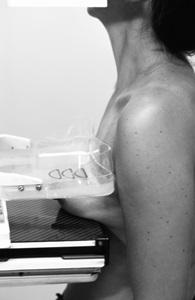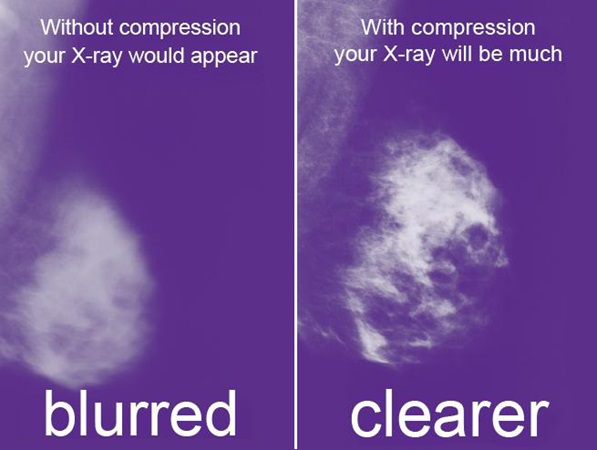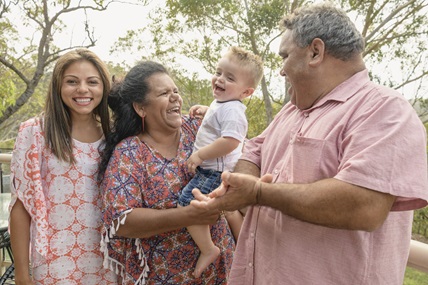About screening mammograms
See this information in a language other than English.
What is a screening mammogram?
BreastScreen WA provides over 130,000 screening mammograms each year to Western Australian women. A screening mammogram is a low dose X-ray of a woman’s breast. Screening mammograms are performed on women with no breast symptoms, for the purpose of detecting breast cancer at an early stage before it can be felt or noticed.
Why are screening mammograms important?
Screening mammograms are performed on women 40 years or over with no breast symptoms every two years, for the purpose of detecting breast cancer at an early stage before it can be felt or noticed.
Did you know?
- Women in Australia have a 1 in 7 risk of developing breast cancer in their lifetime
- The risk of breast cancer increases with age
- A mammogram can detect 70-90% of breast cancers
- Screening mammograms may detect a very small cancer, as small as a grain of rice, before you or your doctor can feel it
- Breast cancer cannot be prevented, but the earlier a breast cancer is detected the better the chance of successful treatment
Who can have a screening mammogram?
BreastScreen WA provides FREE screening mammograms to Western Australian women 40 years or over with no breast symptoms every two years.
Women aged 50 to 74 years are encouraged to attend by way of personalised letters since the benefit from screening mammography is greatest for women in this age group.
Over 75% of breast cancers occur in women over 50 years of age.
What if I am a woman under 40 years?
See women under 40.
What if I am a woman over 75 years?
See women over 75.
What if I am a woman with:
- Family history of breast cancer?
- Breast implants?
- A disability?
- A breast symptom?
- A previous history of breast cancer? Women over the age of 40 who have a past history of breast cancer may attend the program. Women will be invited annually once they are enrolled in the program.
What if I am pregnant or breastfeeding?
If you are pregnant, it is advisable you postpone your screening mammogram until after the birth. Pregnant women can develop breast cancer, and are recommended to see their GP if they develop any new breast symptoms such as a breast lump.
If you are breastfeeding, it is advisable you postpone your screening mammogram until at least 3 months after finishing lactation. This is because a woman’s breast tissue is very dense whilst breast feeding and a mammogram may not be as effective.
Should I have a screening mammogram?
Breast cancer cannot be prevented, but the earlier a breast cancer is detected the better the chance of successful treatment.
A mammogram may detect a very small cancer before you or your doctor can feel it.
BreastScreen WA provides over 130,000 screening mammograms each year to Western Australian women. For every 1,000 women screened, 950 will have no abnormality and will receive a letter within approximately ten working days to confirm their mammogram was normal. Approximately 50 women will be called back for further tests and up to 6 of these women may have a breast cancer detected.
.png?h=480&w=800&hash=0BA4893B4606D3C49988B4EA5BC52B66)
How often should I have a mammogram?
Every two years. Remember, once is not enough.
Regular screening mammograms every two years assists in detecting any unusual changes in your breasts at an early stage.
There are some cancers that cannot be detected by screening mammograms. See your GP / family doctor promptly if you notice any unusual changes in your breasts such as lumps, nipple discharge or persistent new breast pain, even if your last screening mammogram was normal.
How is a screening mammogram performed?
A specially trained female radiographer will take your mammogram. Usually two X-rays are taken of each breast, one from the side and one from the top. The whole appointment takes about 20 minutes. Your images will be read by two medical specialists (radiologists). BreastScreen WA retains your mammograms for at least seven years for future comparison.
All staff at BreastScreen WA's metropolitan and regional screening clinics are female, and are expected to practise in a sensitive and respectful manner. Clients can request a medical observer* to be present during their mammogram procedure if they wish, but due to staff availability the appointment may need to be rescheduled to another time and place so that this request can be accommodated.
*A medical observer must be a BreastScreen WA employed staff member governed by the Australian Health Practitioner Regulation Agency or professional body including medical, nursing, midwifery or allied health and be of a gender approved by the patient.
How reliable is breast screening?
Screening mammograms may detect 70-90% of breast cancers.
For all women, there is a chance that mammography will either:
- miss a change due to breast cancer (false negative)
- further tests will be performed to examine a change that is not due to breast cancer (false positive)
Not all breast cancers found on your mammogram can be cured.
Is a mammogram painful?
To obtain a clear picture and to minimise the radiation dose, the breast is positioned and compressed between two flat plates. This may be uncomfortable, but lasts only a few seconds.

Compression improves mammograms because:
- Compression holds the breast firmly which reduces movement and blurring
- Compression spreads the breast tissue so that small changes are less likely to be hidden
- Compression flattens the breast to an even thickness so that only a low dose of radiation is needed to see through the breast tissue
Is a mammogram harmful?
The risk of getting cancer from a screening mammogram is considered very low. The benefit of early diagnosis and treatment of breast cancer far outweighs the risk of the small amount of radiation received during a screening mammogram. More information on radiation.
Your decision
Some women may feel embarrassed about having a mammogram. BreastScreen WA respects each woman’s privacy and dignity. The choice to have a screening mammogram is yours. In making this decision you may wish to discuss your individual circumstances with your doctor.
Height and Weight Information
BreastScreen WA is collecting information regarding height and weight at the time of mammography. This information may be useful in the future to improve the effectiveness of breast cancer screening. BreastScreen WA is asking if you would consider recording your height and weight today. Scales and a height measure are available for your use if required. Participation is completely voluntary. Not participating will not affect your care in any way.
Learn more about breast screening
Book online or phone 13 20 50
When making your appointment, please let us know if you:
- have breast implants
- require an interpreter
- use a wheelchair.
These things may make your appointment a little longer.
If you need an interpreter, please call the Translating and Interpreting Service (TIS) first on 13 14 50 and ask to be connected to the BreastScreen WA call centre on 13 20 50.
NOTE:
Wheelchair access is available at all BreastScreen WA services.
Appointments are available 7:30am-5:45pm on weekdays and 8:15am-11:30am on Saturdays at most BreastScreen WA clinics.
BreastScreen WA has metropolitan, regional and mobile screening services.
There are twelve permanent clinics located in:
Albany, Bunbury, Cannington, Cockburn, David Jones - Perth City, East Perth - Mardalup, Joondalup, Mandurah, Midland, Mirrabooka, Padbury, and Rockingham.
Appointments are available 7:30am-5:45pm on weekdays and 8:15am-11:30am on Saturdays at most BreastScreen WA clinics.
Mobile breast screening services visit outer metropolitan areas and country towns every two years. Some towns are visited annually.
- Please bring your Medicare card with you to your appointment.
- Women whose breasts become tender before their periods find it more comfortable to have a mammogram during or just after a period.
- Please don’t wear talcum powder or deodorant on the day of your appointment. It may show on the X-ray picture.
- Please be aware you will be reading information and signing a consent form at the appointment.
Get to know your breasts and what is normal for you. Look in the mirror at your breasts and feel your breasts from time to time.
If you notice any unusual changes in your breasts such as lumps, nipple discharge, or persistent new breast pain, even if your last screening mammogram was normal, please see your GP promptly.
Ask your GP about breast health at your next check-up.
Use our contact form or call BreastScreen WA on:
13 20 50 for appointments
9323 6700 for information


